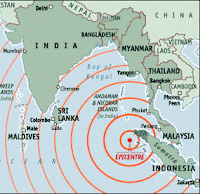Climate change refers to the variation in the Earth's global climate or in regional climates over time. It describes changes in the variability or average state of the atmosphere over time scales ranging from decades to millions of years.
In recent usage, especially in the context of environmental policy, the term "climate change" often refers only to changes in modern climate, including the rise in average surface temperature known as global warming.
The factors
Glaciers are recognized as one of the most sensitive indicators of climate change. Glaciers grow and collapse, both contributing to natural variability and greatly amplifying externally-forced changes. For the last century, however, glaciers have been unable to regenerate enough ice during the winters to make up for the ice lost during the summer months.
Climate changes can also result from interaction of the atmosphere and oceans. Many climate fluctuations, the best known being the El Niño Southern oscillation but also including the Pacific decadal oscillation, the North Atlantic oscillation, and the Arctic oscillation, owe their existence at least in part to different ways that heat can be stored in the oceans and move between different reservoirs. On longer time scales ocean flows play a key role in redistributing heat, and can dramatically affect climate.
Current studies indicate that radiative forcing by greenhouse gases is the primary cause of global warming. Greenhouse gases are also important in understanding Earth's climate history. According to these studies, the greenhouse effect, which is the warming produced as greenhouse gases trap heat, plays a key role in regulating Earth's temperature.

The biggest factor of present concern is the increase in CO2 levels due to emissions from fossil fuel combustion. Beginning with the industrial revolution in the 1850s and accelerating ever since, the human consumption of fossil fuels has elevated CO2 levels from a concentration of ~280 ppm to more than 380 ppm today. These increases are projected to reach more than 560 ppm before the end of the 21st century.
The Kyoto Protocol to the United Nations Framework Convention on Climate Change is an amendment to the international treaty on climate change, assigning mandatory emission limitations for the reduction of greenhouse gas emissions to the signatory nations.
Prior to widespread fossil fuel use, humanity's largest impact on local climate was likely to have resulted from land use. Irrigation, deforestation, and agriculture fundamentally change the environment. For example, they change the amount of water going into and out of a given location.
They also may change the local albedo by influencing the ground cover and altering the amount of sunlight that is absorbed. For example, there is evidence to suggest that the climate of Greece and other Mediterranean countries was permanently changed by widespread deforestation between 700 BC and 1 AD.
Al GoreAl Gore reviews the scientific opinion on climate change, discusses the politics and economics of global warming, and describes the consequences he believes global climate change will produce if the amount of human-generated greenhouse gases is not significantly reduced in the very near future.
The film, An Inconvenient Truth, includes many segments intended to refute critics who say that global warming is insignificant or unproven. For example, Gore discusses the risk of the collapse of a major ice sheet in Greenland or in West Antarctica, either of which could raise global sea levels by approximately 20 feet (6m), flooding coastal areas and producing 100 million refugees.
Meltwater from Greenland, because of its lower salinity, could halt the Gulf Stream current and quickly trigger dramatic local cooling in Northern Europe.
The documentary ends with Gore noting that if appropriate action is taken soon, the effects of global warming can be successfully reversed by releasing less carbon dioxide. Gore calls upon viewers to learn how they can help in this initiative.
What to do?10 simple things we can do to stop global warming:
1. Replace regular lightbulbs with compact fluorescent ones
( 150 pounds of carbon dioxide saved a year )
2. Drive less
( 1 pound of carbon dioxide for every mile you don't drive )
3. Recycle more
( 2400 pounds of carbon dioxide is saved every year if half your household waste is recycled )
4. Keep your tyres properly inflated
( Saves your gas mileage by more than 3 percent. Every gallon saved means 20 pounds of carbon dioxide kept out of the atmosphere )
5. Use less hot water
( Instal a low flow shower head - 350 pounds of carbon dioxide saved every year. Use cold or warm water and save 500 pounds of carbon dioxide )
6. Avoid products with a lot of packaging
( 1200 pounds of carbon dioxide saved by reducing rubbish by 10% )
7. Reduce your heating and air conditioning usage
( Save 2000 pounds of carbon dioxide yearly by turning heating down by 2 degrees in winter and cooling by 2 degrees in summer )
8. Plant a tree
( Just one tree absorbs a ton of carbon dioxide in its life time )
9. Turn off electronic devices instead of setting it to standby
( Saves thousands of pounds of carbon dioxide every year )
10. Be a part of the solution
( Take active part in above and see the film "An Inconvenient Truth" )
Well Mat Salo "You Asked For It". The above is a very simplified explanation of the phemenon to a layman.This is MY CONTRIBUTION to the Global Warming issue and hopefully readers adopt the above measures religiously to reduce the warming and climate change which could bring disastrous effects of wind turbulence (hurricanes), rains, floods, or droughts and the consequent destruction to man and property. So please pass the above message to your friends. We have and are already seeing some of its effects now. It could only get worse in the future.


































 BBC correspondent Alan Johnston has reportedly been freed from kidnappers in Gaza after almost four months in captivity.
BBC correspondent Alan Johnston has reportedly been freed from kidnappers in Gaza after almost four months in captivity. See below the hotspots from a satellite photo by MMD.
See below the hotspots from a satellite photo by MMD. The red spots are hot spots.
The red spots are hot spots. Meanwhile, Malaysia has said that it cannot help prevent fires in Indonesia until an MoU is signed with that country. See report
Meanwhile, Malaysia has said that it cannot help prevent fires in Indonesia until an MoU is signed with that country. See report 



